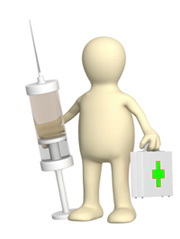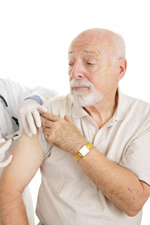Children's Immunisation Schedule
Here's a checklist of the vaccines that are routinely offered to everyone in the UK for free on the NHS, and the age at which you should ideally have them.
2 months:
- Diphtheria, tetanus, pertussis (whooping cough), polio and Haemophilus influenzae type b (Hib, a bacterial infection that can cause severe pneumonia or meningitis in young children) given as a 5-in-1 single jab known as DTaP/IPV/Hib
- Pneumococcal infection
 3 months:
3 months:
- 5-in-1, second dose (DTaP/IPV/Hib)
- Meningitis C
4 months:
- 5-in-1, third dose (DTaP/IPV/Hib)
- Pneumococcal infection, second dose
- Meningitis C, second dose
Between 12 and 13 months:
- Meningitis C, third dose
- Hib, fourth dose (Hib/MenC given as a single jab)
- MMR (measles, mumps and rubella), given as a single jab
- Pneumococcal infection, third dose
3 years and 4 months, or soon after:
- MMR second jab
- Diphtheria, tetanus, pertussis and polio (DtaP/IPV), given as a 4-in-1 pre-school booster
Around 12-13 years:
- Cervical cancer (HPV) vaccine, which protects against cervical cancer (girls only): three jabs given within six months
Around 13-18 years:
- Diphtheria, tetanus and polio booster (Td/IPV), given as a single jab
65 and over:
- Flu (every year)
- Pneumococcal
HPA Childrens Vaccination Schedule
Click here for the recommended HPA vaccination schedule
Seasonal Flu Vaccination
Influenza – flu – is a highly infectious and potentially serious illness caused by influenza viruses. Each year the make-up of the seasonal flu vaccine is designed to protect against the influenza viruses that the World Heal th Organization decide are most likely to be circulating in the coming winter.
th Organization decide are most likely to be circulating in the coming winter.
Regular immunisation (vaccination) is given free of charge to the following at-risk people, to protect them from seasonal flu:
- people aged 65 or over,
- people with a serious medical condition
- people living in a residential or nursing home
- the main carers for an elderly or disabled person whose welfare may be at risk if the carer becomes ill
- healthcare or social care professionals directly involved in patient care, and
- those who work in close contact with poultry, such as chickens.
Pregnant women & the Flu Vaccination
It is recommended that all pregnant women should have the flu vaccine, whatever stage of pregnancy they're in. This is because there is good evidence that pregnant women have an increased risk of developing complications if they get flu, particularly from the H1N1 strain.
Studies have shown that the flu vaccine can be safely and effectively given during any trimester of pregnancy. The vaccine does not carry risks for either the mother or baby. In fact, studies have shown that mothers who have had the vaccine while pregnant pass some protection to their babies, which lasts for the first few months of their lives.
These links all come from trusted resources but if you are unsure about these or any other medical matters please contact your doctor or pharmacist for advice